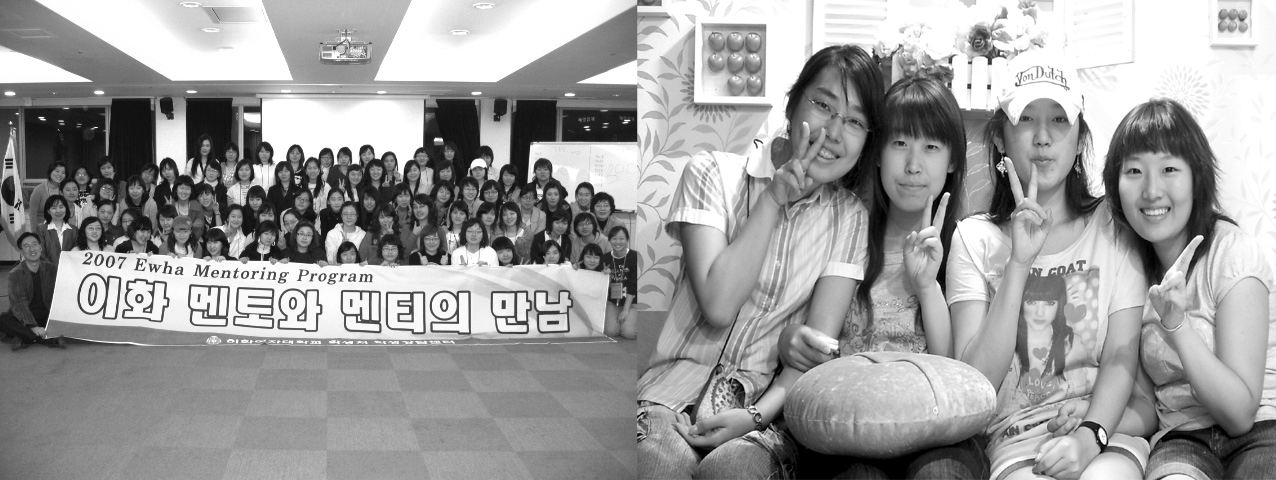
From registering for classes to making new friends, lots of freshmen have a hard time adjusting to their new college life, since many things are different from their high school years. Thus, the Student Counseling Center established a mentoring program in the spring semester of 2007, in which three freshmen teamed up with one junior or sophomore for advice and support. Also, the program accompanies a supervisor who advises both mentor and mentee to execute the program.
?his program was formed to ease the hardships of freshmen in adjusting to school life and to help them form close relationships not only with their peers but also with their seniors. The program also manages to develop potential ability of the mentor,?said Kang Soon-wha, the chief of the Student Counseling Center. ?e formed teams within the same major to allow freshmen to ask questions about curricula and career paths,?said Kang.
Mentors and mentees meet seven times as a group and once individually, just the mentor and one mentee, during a semester. ?e usually met at the school cafeteria during our spare hours and talked about unfamiliar aspects of school life and got useful advices. We also shared information about exchange student programs, how to start writing for my first thesis paper, and what courses would be beneficial for me to take. It was a very helpful opportunity because the information the mentor gave me was different from the superficial knowledge I got from the Internet. It was more practical and trustworthy,?said Lee Jung-eun (English Education, 1), a mentee. ?y mentor also took us off campus to show us some good places to eat lunch, which is a crucial information,?said Lee.
Kwon Jea-hyeon (Philosophy, 2), a mentor, said that the mentoring program is a special opportunity, especially for students from the divisions of social science and liberal arts. ?reshmen whose majors are not decided can wander around a lot for they do not know what to major in. However, with the help of mentors, students can discover what they would like to major more easily. Saving the time of wandering also helped them to concentrate on their studies and score a good grade,?said Kwon.
Another mentor, Kim Kyung-hee (Journalism, 2), said that at first, she prepared a fun psychological test and activities to get to know her mentees well. As time went by, her mentees opened their hearts and they were able to have deeper talks about their future and concerns. ?uring the Dae-dong festival, we went to see a movie at the Cinematech, a school club that shows free movies to students. It was not only a new experience for mentees, but also for me. It was also my first time visiting there,?said Kim.
The mentoring program also includes Membership Training (MT), a kind of group retreat, in April. Kim says going on MT with her mentees was a great experience. ?lthough we regularly meet for our mentoring session, we were always running out of time. However, going on MT and talking all night long gave us a chance to share our deep concerns,?said Kim. Even though the mentoring program was established to help freshmen, mentors say that they also learned a lot from the mentoring sessions. ? first thought that the mentoring program was just about mentors giving out information for the benefit of others. But later, I learned that this program also helped me look back on myself because I was conscious that I had to be a good role model to them,?said Kim. Kwon agreed, saying that she became more careful in her behavior after realizing she might meet her mentees at any time, anywhere on campus.
Although the program had a good start in the spring semester, participants say there is some room for improvement. ? think participation in the mentoring program is low, probably due to low recognition since it was the first time for this program. I wish more people could know about this program and benefit from it,?said Lee Jung-eun.
On a more serious note, Lee says, ?here were some people from other groups complaining that their group time was not spent, and they wished the programs were more organized.?Kim also wishes the Student Counseling Center would give mentors some specific guidelines to make the program more organized. ?ometimes it is hard to decide what activities to schedule,?said Kwon, who also said, ? wish the network between mentee-mentor teams could be strengthened. It would be very helpful for us to share what each team is doing and how they are solving problems.?The Student Counseling Center accepts the fact that the program needs to be improved. ?e had a reporting system in which mentees had to write a report every week, and had monthly meeting with the supervisors. After receiving these feedbacks from mentees we have made some changes that could strengthen the weaknesses,?said the chief of the counseling center, Kang.
?ow the center will schedule meetings with the supervisors, not only for mentees but also for mentors, so that mentors can receive more professional help,?added Kang. Other than the regular meetings where three mentees meet one mentor, the center also included one on one meetings in the program so that mentees could share their deeper concerns. The center is also planning to distribute materials that was made based on the feedback received from mentors. The Student Counseling Center will hold workshops and special lectures for the mentors and the mentees that will offer them opportunities to learn

